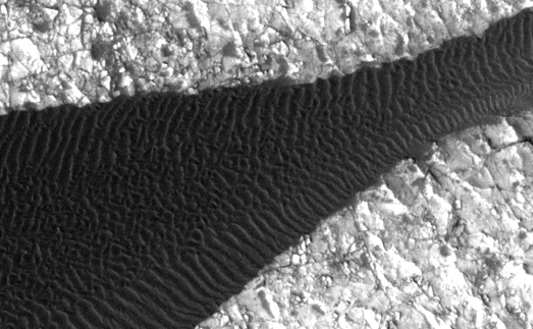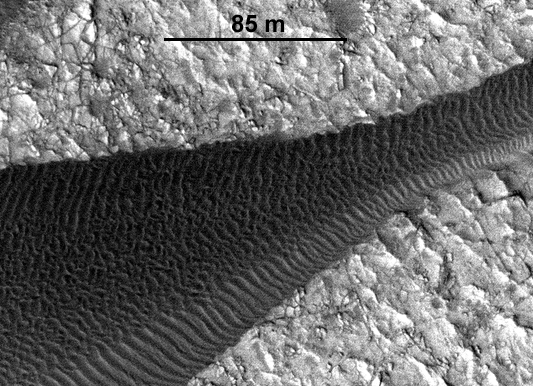Ripple Movement on Sand Dune in Nili Patera, Mars

| Credit | NASA/JPL-Caltech/Univ. of Arizona/JHU-APL |
|---|---|
| Language |
|
Back-and-forth blinking of this two-image animation shows movement of ripples covering a sand dune on Mars. The images are part of a study published by Nature on May 9, 2012, reporting movement of Martian sand dunes at about the same flux (volume per time) as movement of dunes in Antarctica on Earth.
The before-and-after images were taken 15 weeks apart by the High Resolution Imaging Science Experiment (HiRISE) camera on NASA's Mars Reconnaissance Orbiter. The scale bar is 85 meters (279 feet). The site is part of a dune field inside the summit caldera of Nili Patera, an ancient volcano, at 8.7 degrees north latitude, 67.3 degrees east longitude.
The images show a dark, rippled sand dune overlying bright-toned rock. They have been "orthorectified," that is, adjusted such that they appear as if viewed from directly overhead. They were then positionally tied together by registering fixed features on the bedrock seen in one image to the same features seen in the other. When the images are blinked back and forth, ripple motion during the intervening period of 105 days is clearly seen.
The first image, in which the side of the dune toward the bottom of the frame looks paler due to lighting effects, was taken on June 30, 2007. It is one image product of HiRISE observation PSP_004339_1890. Other image products from the same observation are at http://hirise.lpl.arizona.edu/PSP_004339_1890 . The "after" image was taken on Oct. 13, 2007. Other image products from the same HiRISE observation are at http://hirise.lpl.arizona.edu/PSP_005684_1890 .
HiRISE is one of six instruments on NASA's Mars Reconnaissance Orbiter. The University of Arizona, Tucson, operates the orbiter's HiRISE camera, which was built by Ball Aerospace & Technologies Corp., Boulder, Colo. NASA's Jet Propulsion Laboratory, a division of the California Institute of Technology in Pasadena, manages the Mars Reconnaissance Orbiter Project for the NASA Science Mission Directorate, Washington.

